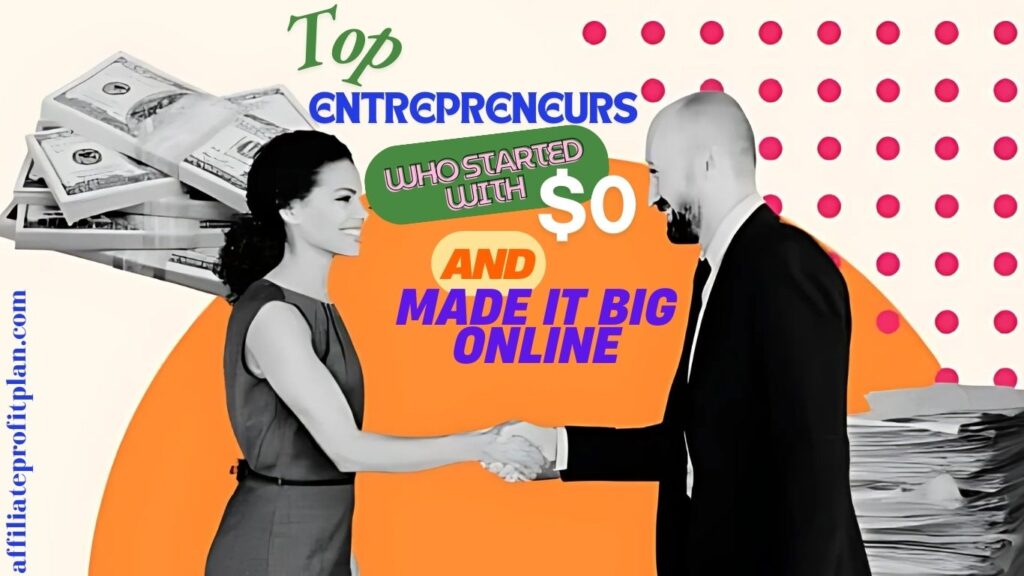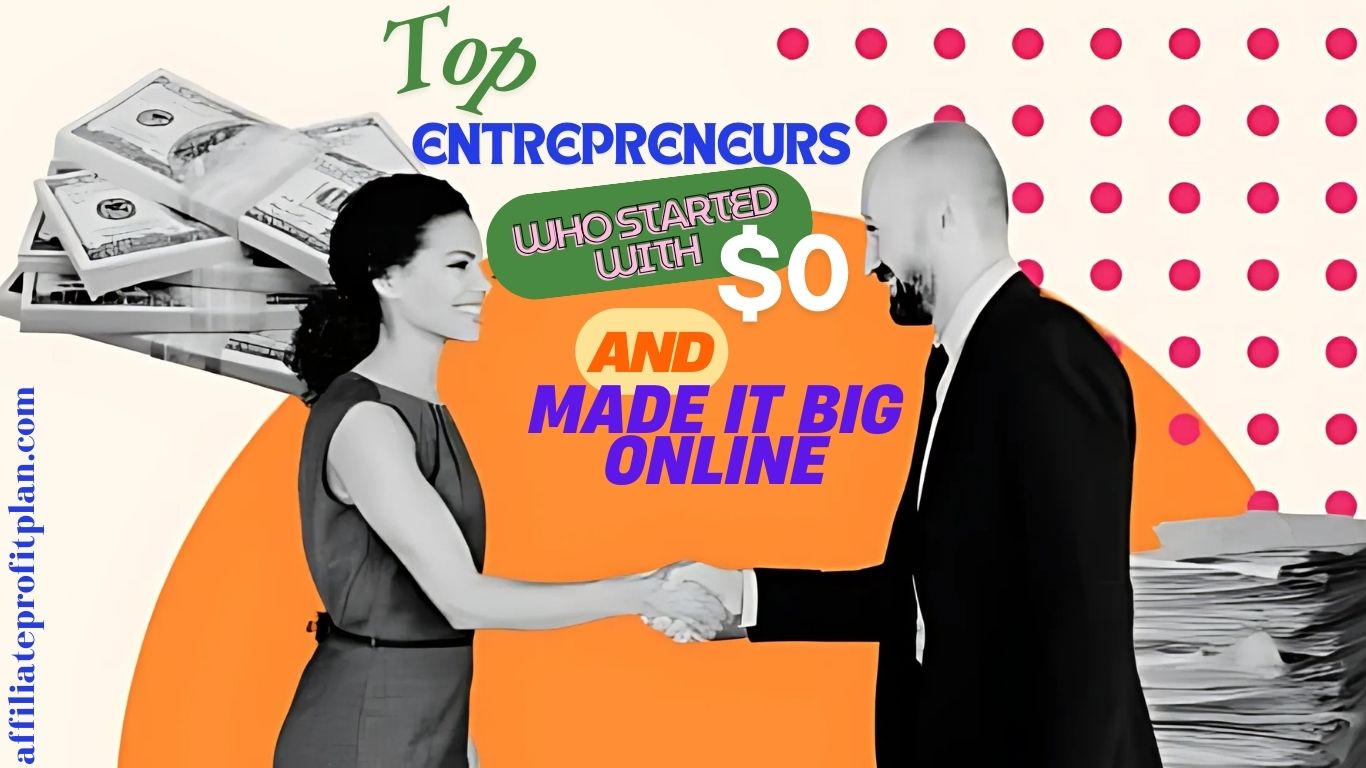Welcome to my article Top Entrepreneurs Who Started with $0 and Made It Big Online. Ever wonder how some entrepreneurs seem to go from nothing to “millionaire by 30” without a trust fund or a rich uncle in the mix? It’s the magic of the internet, where opportunities abound for those with a little grit, creativity, and the willingness to hustle. While the idea of starting a business with $0 may sound like a fantasy, many successful online entrepreneurs did just that—turning limited resources into massive digital empires.
From YouTube stars to self-made tech moguls, these go-getters didn’t need an investment portfolio or fancy degrees to make it big online. All they needed was the courage to take that first step and the determination to keep going—even when their bank account was emptier than a gym at 6 a.m. on January 1st. In this article, we’ll dive into the stories of top entrepreneurs who started with zilch and built businesses that are now worth millions (or even billions). Spoiler alert: They didn’t have a magic wand, just hard work, smart strategies, and a sprinkle of internet wizardry.
So grab your coffee (or your favorite energy drink), because we’re about to explore how these entrepreneurs turned “zero” into “wow!”—and how you can do the same. Ready to get inspired? Let’s go!
Access My Proven Blueprint for $50-$100 Daily Income – Watch This FREE Video Now >>>

The Power of Perseverance: How They Overcame Challenges
If there’s one thing that all successful entrepreneurs who started with nothing have in common, it’s this: they didn’t give up. Sure, they faced the kind of challenges that would make even the most optimistic person question their life choices (like having to eat ramen for dinner while trying to launch a business), but they kept going. Why? Because they had perseverance, and that’s the secret ingredient to turning $0 into a thriving online empire.
Let’s talk about the first hurdle most of these entrepreneurs encountered: self-doubt. When you’re starting with nothing, it’s easy to feel like the deck is stacked against you. But for entrepreneurs like Michelle Phan (who went from filming makeup tutorials in her bedroom to creating a multi-million dollar beauty empire with Ipsy), overcoming self-doubt was key. Despite the fact that she started with zero funding and faced rejection from investors, she stayed focused on her vision. Phan didn’t see failure as a setback but as a stepping stone toward success.
Then there’s the challenge of limited resources. You don’t exactly need a Fortune 500 budget to succeed online, but when you’re starting from scratch, having little to no money to spend can feel like trying to build a house with no bricks. That’s where resourcefulness comes in. Pat Flynn, for example, started his business after being laid off. With no funds to invest, he started by sharing his journey on his blog (Smart Passive Income) and building his audience. It wasn’t glamorous, but it worked. Slowly, he learned to leverage free tools like Google Analytics, social media, and SEO—proving that even a lack of cash doesn’t have to stop you from making money online.
And, of course, there’s the ever-present fear of failure. It’s like that nagging voice that pops up just when things are starting to take off: “What if this doesn’t work?” Entrepreneurs who start with nothing face this fear head-on. Take Sophia Amoruso, who started Nasty Gal by selling vintage clothing on eBay. She faced plenty of setbacks and doubts, but rather than letting those challenges derail her, she leaned into them. Her persistence paid off, and Nasty Gal grew into a global fashion brand.
In the world of online entrepreneurship, challenges are inevitable. What sets these entrepreneurs apart is their ability to push through them. They saw each obstacle as a lesson, not a roadblock. And that kind of perseverance? That’s the power that transforms a $0 startup into a thriving business.
Case Studies of Top Entrepreneurs Who Started with $0
If you think you need a hefty bank account to become an online success, think again. The following entrepreneurs began with absolutely nothing, but through a combination of ingenuity, determination, and a little bit of luck (okay, maybe a lot of hard work), they turned their zero-dollar starts into multi-million-dollar empires. So, grab your popcorn, because these real-life success stories are a masterclass in how to hustle your way to the top.
1. Michelle Phan: The Queen of YouTube and Beauty
Michelle Phan didn’t start with a lavish beauty fund or a background in cosmetics—she started with a camera, a YouTube channel, and a passion for makeup. In 2007, Phan uploaded her first YouTube tutorial, a simple “how-to” on applying makeup, all filmed in her bedroom. It wasn’t fancy. It didn’t have professional lighting or expensive equipment. But what it had was heart—and a genuine connection with her audience.
Her persistence paid off. Phan’s YouTube channel exploded in popularity, eventually attracting brand sponsorships and a loyal following. But she didn’t stop there. In 2011, she co-founded Ipsy, a beauty subscription service, which now boasts over 3 million subscribers. Her business didn’t start with a huge investment or a team of professionals—it started with passion, free platforms like YouTube, and the sheer determination to make her mark. If there’s a blueprint for starting from nothing, Michelle Phan has practically written the manual.
2. Pat Flynn: The Passive Income Guru
When Pat Flynn lost his job as an architect in 2008, he had no backup plan. He didn’t have venture capital or a hefty savings account to fall back on. What he did have, however, was the knowledge he’d gained studying for a LEED certification exam (which he had studied for while unemployed). Rather than letting his unemployment define him, Pat launched a blog and started sharing his study materials.
His first success came from selling study guides, and from there, Pat continued to grow his online business by creating valuable content that helped others learn about passive income. His website, Smart Passive Income, became a go-to resource for those looking to build online businesses without big startup costs. Today, Pat is one of the most respected names in passive income, earning millions from affiliate marketing, online courses, and podcasting—all from that zero-dollar beginning.
3. Sophia Amoruso: From eBay Seller to Fashion Mogul
Sophia Amoruso’s rise to fame wasn’t what you’d call typical. She started by selling vintage clothes on eBay, using little more than her love for fashion and her eye for quirky items that could fetch a good price. No investment, no funding—just hustle and an Instagram-worthy sense of style.
In 2006, Amoruso began selling hand-picked, vintage clothing on eBay under the name Nasty Gal Vintage, but as the demand for her clothes grew, so did her ambition. What began as a one-woman operation from her apartment soon morphed into a full-fledged e-commerce business. Nasty Gal went from a small eBay shop to one of the top fashion retailers in the U.S., eventually reaching over $100 million in sales. Amoruso’s success story is proof that all you need is a passion for something and the perseverance to turn that passion into something profitable—even if you start with absolutely nothing.
4. Ryan Higa: From YouTube Fun to Global Recognition
Remember the YouTube days when you’d scroll through videos of random skits and pranks? One of the people behind that early YouTube magic was Ryan Higa, who started posting comedic videos on YouTube with zero budget, just raw talent and a camera. In the early 2000s, YouTube was still a new platform, and Ryan didn’t have a huge following or fancy equipment—he had to make do with a small camera and his funny ideas.
His comedy sketches became viral hits, and Ryan quickly grew his YouTube channel, Nigahiga, into one of the most subscribed channels at the time. As his fanbase expanded, so did his business ventures. Ryan leveraged his fame to create a series of successful side projects, including acting, producing, and co-founding a digital media company. His journey proves that creativity can triumph over any financial roadblock.
5. Steve Pavlina: The Personal Development Pioneer
Steve Pavlina’s story shows how, with a commitment to personal growth, a blog can turn into a thriving business. He started his personal development blog in 2004 with little more than a deep desire to help others live better lives. He didn’t have investors, he didn’t have a team, and he certainly didn’t have a marketing budget. But Steve did have something else: relentless passion and a deep understanding of what it takes to build a loyal audience.
His blog grew steadily, thanks to his no-nonsense advice, consistent posts, and an ever-growing audience of readers who were looking for practical tips on self-improvement. Today, Pavlina’s personal development empire includes paid products, courses, and speaking gigs—proof that one person with a blog, a little know-how, and a desire to share knowledge can go from $0 to a successful, sustainable business.
Conclusion
From beauty gurus to passive income experts, these entrepreneurs prove that starting with $0 doesn’t have to be an obstacle—it can be the ultimate catalyst for success. They all began with limited resources but rich ideas and determination. Their stories are a reminder that with enough grit, creativity, and perseverance, anyone can build an empire online, no matter how small their starting point. So, what’s stopping you?
Common Strategies They Used to Build Success
Starting with $0 doesn’t mean starting with nothing—it means starting with an idea, a passion, and a lot of grit. The entrepreneurs who made it big online have proven that success isn’t just about having the right funding or connections (though those help). It’s about having the right strategies, and believe it or not, many of these self-made moguls followed similar game plans. Let’s break down some of the most common strategies they used to turn zero dollars into online empires—and spoiler alert: they don’t involve secret formulas or magic potions, just smart, consistent work.
Access My Proven Blueprint for $50-$100 Daily Income – Watch This FREE Video Now >>>
1. Leveraging Free Platforms to Build an Audience
One of the most powerful strategies these entrepreneurs used was leveraging free platforms to build an audience. Whether it’s YouTube, a blog, or social media, many successful online business owners began by giving away value for free in exchange for attention and trust.
Take Pat Flynn, for example. When he lost his job, he started by blogging and sharing the study guides he created while studying for his LEED exam. He didn’t pay for fancy ads or marketing—he simply used his blog as a way to provide value to his audience. Over time, this led to affiliate marketing opportunities, paid sponsorships, and a loyal following. Michelle Phan did the same thing, creating YouTube videos that taught makeup tutorials, and Sophia Amoruso used eBay as a platform to sell vintage clothes. These entrepreneurs used free platforms not just to get noticed but to build a community that trusted them and eventually turned into paying customers.
2. Consistency Over Perfection
If there’s one thing we can learn from these entrepreneurs, it’s that consistency is key. Sure, perfection is great, but consistency beats it every time. Many of these online success stories started out with humble content and minimal resources, but what they all had in common was the drive to show up every single day.
Michelle Phan didn’t start with professional lighting or an army of stylists; she just kept making makeup videos, and she did it consistently. Ryan Higa built his YouTube empire by posting comedic sketches regularly, even before he had a massive following. Pat Flynn didn’t create a bestselling book or course on his first try, but he kept posting valuable content on his blog. Each small step built upon the last, and over time, consistency paid off in spades. These entrepreneurs show that progress doesn’t always need to be glamorous—what matters most is showing up and staying dedicated, even when things feel slow.
3. Building Relationships and Networking
Even in the digital age, success is often about who you know, not just what you know. These self-made entrepreneurs understood the power of networking and building meaningful relationships, whether online or in person. For example, Sophia Amoruso didn’t just sell clothes on eBay—she built relationships with her customers, made sure they were loyal, and engaged with them through social media and email marketing. She listened to their feedback, tweaked her offerings, and turned a small shop into a booming fashion business.
Similarly, Pat Flynn built an online network of fellow entrepreneurs and influencers who helped promote his content and products. Networking in the online world doesn’t always mean attending fancy events—it’s as simple as engaging on social media, collaborating with like-minded creators, and building a community that supports and shares your vision. Relationships, whether with customers or fellow entrepreneurs, can become one of the most valuable assets in business.
4. Utilizing Automation and Outsourcing
As their businesses grew, many of these entrepreneurs didn’t do it all themselves—they used automation and outsourcing to scale their operations efficiently. While some may have started with their own two hands and a laptop, they quickly realized that success comes from working smarter, not harder.
For example, Michelle Phan outsourced the production of Ipsy’s subscription boxes, allowing her to focus on growing the brand rather than getting bogged down in logistics. Ryan Higa used a team of editors, writers, and collaborators to help produce his comedy videos at scale. Similarly, Pat Flynn used automation tools to manage his blog’s content and email marketing, freeing him up to focus on growing his business and creating new products. By learning to delegate and use technology to their advantage, these entrepreneurs were able to maximize their time and efforts—key strategies when scaling a business from zero.
5. Staying Resilient and Embracing Failure
One of the most important strategies that these entrepreneurs used was the ability to stay resilient in the face of failure. In fact, many of them embraced failure as part of the process.
Take Sophia Amoruso, who faced multiple setbacks with Nasty Gal. From financial struggles to inventory mismanagement, she encountered more than her fair share of failures. But rather than throwing in the towel, she used each challenge as an opportunity to learn and grow. Pat Flynn’s journey also wasn’t all sunshine and rainbows—he had to pivot and change directions when his initial online business ventures didn’t work out. But instead of quitting, he adapted and refined his approach, ultimately finding success.
Resilience is key to making it in the online business world. These entrepreneurs didn’t shy away from challenges—they leaned into them, knowing that each setback was just another step closer to success. In fact, many of them would tell you that their failures were some of their greatest teachers.
Conclusion
When you’re starting with $0, the road to success might seem like an uphill battle, but these entrepreneurs show that it’s more than possible to make it big online with the right strategies. By leveraging free platforms, staying consistent, building relationships, outsourcing, and embracing failure, they transformed their humble beginnings into multi-million-dollar businesses. So, if you’re ready to turn your own zero-dollar dream into reality, take a page from their playbook—and remember, success might be just one consistent step away.
Lessons You Can Apply Today
Alright, let’s get down to brass tacks: you’ve read the success stories, you’ve seen the strategies, and now you’re wondering, “How can I apply all this to my own journey?” The good news is that the lessons from these top entrepreneurs aren’t just for people who’ve already made it—they’re lessons you can start using right now, today, to kick-start your own path to success. And don’t worry, you don’t need a magic formula or a shiny new startup capital to make it happen. What you need is a plan, a little grit, and a lot of follow-through. Let’s break down some key takeaways that can help you move the needle forward—no big budget required.
1. Start Small, Scale Gradually
The idea of “starting small” often gets overlooked in our hustle-obsessed culture, but it’s one of the most powerful strategies you can adopt. Sophia Amoruso didn’t wake up one day and launch a global fashion empire. She started by selling a few vintage clothes on eBay, testing the waters and learning as she went. Pat Flynn began by offering free advice through his blog, gradually turning that content into revenue streams. The key here? Don’t feel pressured to have a big launch or massive success from day one. Small steps are the building blocks for bigger things. And by starting small, you’re not just minimizing risk; you’re allowing yourself the chance to learn and adjust without throwing everything on the line.
So, whether you’re planning to start a blog, an online store, or a digital service, begin with a focused niche, a minimal viable product, or a single service. Test the waters and adjust. Once you get some traction, scale at your own pace. That’s how you build a sustainable business, not by jumping in head-first without a plan.
2. Leverage the Power of Free Tools
Let’s face it—most of us don’t have a big budget when we’re just starting out. The good news is that you don’t need one to get started. From Canva to Google Analytics to Mailchimp, there are a ton of free tools that can help you build a solid foundation without spending a dime. Many of these free resources were crucial to the success of entrepreneurs who started with nothing.
Take a page from Ryan Higa’s playbook—he didn’t have a fancy camera crew for his YouTube videos; he simply used his own creativity, a cheap camera, and free video editing software. What’s important here is that he focused on delivering value, not on the tools. So, before you go splurging on pricey software or marketing services, see what free tools are available to get the job done. As you grow, you can reinvest in your business—but the best part about starting small is that you get to bootstrap your way to success.
3. Engage with Your Audience
A key lesson from all these successful entrepreneurs is the importance of engagement. They didn’t just talk at their audiences—they built relationships. They listened to feedback, interacted with their followers, and responded to comments. Michelle Phan made sure to engage with her followers on YouTube and Instagram, not just posting makeup tutorials but also responding to comments, asking for feedback, and creating a community around her brand. Pat Flynn did the same by responding to emails and interacting on social media, creating a personal connection with his audience that went beyond the typical influencer-consumer relationship.
So, whether you’re running a blog, social media account, or even a small e-commerce store, make sure to engage with your audience. Ask questions, reply to comments, and acknowledge their concerns. People don’t just want to be sold to—they want to feel heard and understood. Building genuine relationships will help you foster trust and loyalty, and that, my friend, is what leads to long-term success.
4. Embrace Failure as a Lesson, Not a Roadblock
Let’s be honest: failure is inevitable. Even the most successful entrepreneurs have had their fair share of setbacks and mistakes. Sophia Amoruso had to learn this the hard way when her first business venture, a vintage clothing store, didn’t quite take off as she’d hoped. But instead of packing it in, she used that failure to reassess her business model, adjust her strategy, and eventually build Nasty Gal into a fashion giant.
The key takeaway here is that failure isn’t something to fear—it’s something to embrace. When you fail (and you will, trust me), see it as an opportunity to grow. Ask yourself, “What can I learn from this?” instead of, “What did I do wrong?” Failure is a stepping stone to success, and if you’re afraid to fail, you’ll never get to experience the sweet taste of victory.
5. Consistency Wins the Race
This one is non-negotiable. No one gets rich overnight—not even the best entrepreneurs. They all succeeded because they stuck with it, even when the going got tough. Ryan Higa posted videos regularly, despite not seeing immediate success. Michelle Phan uploaded beauty tutorials consistently, even when her views were modest. It wasn’t the flashy gimmicks or quick hacks that got them to the top—it was their commitment to showing up, day after day, with something valuable to offer.
If you’re serious about building something from nothing, you’ve got to commit to the long haul. Success isn’t about finding a shortcut—it’s about consistently showing up and doing the work. Whether you’re blogging, creating videos, or offering a service, make a commitment to keep producing valuable content, building your brand, and improving your skills. Over time, that consistency will pay off in a big way.
Conclusion
There you have it—lessons that entrepreneurs who started with $0 used to turn their dreams into thriving online businesses. By applying these strategies—starting small, leveraging free tools, engaging with your audience, embracing failure, and staying consistent—you too can begin building your path to success. Remember, the road to online entrepreneurship isn’t a sprint, it’s a marathon. So, take it one step at a time, stay resilient, and most importantly, enjoy the journey. Because just like the entrepreneurs we’ve looked at, you’re capable of achieving big things—one small victory at a time.
The Internet as the Great Equalizer: Why Anyone Can Do It
Let’s face it: the Internet has completely flipped the script on what’s possible in business. Once upon a time, you needed deep pockets, fancy connections, or a corporate job title to make a name for yourself in the world of entrepreneurship. Not anymore. The digital age has leveled the playing field, and now anyone with an idea, a computer, and an internet connection can step into the game and build something incredible.
Think about it—the Internet is the great equalizer. It doesn’t matter if you’re young or old, from a small town or a big city, or whether you have an advanced degree or dropped out of high school. If you have the drive and determination, the Internet offers the tools and platforms to create, connect, and ultimately succeed. Heck, some of the most successful entrepreneurs didn’t start with privilege or funding; they just had access to the world’s biggest marketplace right at their fingertips.
Take Gary Vaynerchuk, for example. He didn’t inherit a multi-million-dollar business or come from a background of fancy connections. Instead, he built his empire from the ground up, using social media platforms like YouTube and Twitter to share his insights on wine (yes, wine) and business. Fast forward to today, and he’s one of the most successful entrepreneurs in the digital age. All it took was the Internet, a little hustle, and an entrepreneurial mindset.
But here’s the thing: while the Internet has made it easier than ever to start a business or become an influencer, it’s not an “easy street” to riches. The playing field might be level, but success still requires hard work, creativity, and a willingness to learn. The beauty of the Internet, though, is that anyone—no matter where they’re starting from—has the same opportunity to succeed.
Why? Because the barriers to entry have been obliterated.
Let’s start with the financial side. In the old days, to launch a business, you needed capital for a storefront, inventory, and staff. That’s a hefty investment that most people can’t afford. Today, though, you can build a thriving business with zero investment. E-commerce platforms like Shopify and Etsy allow anyone to sell products without needing to buy large amounts of stock upfront. Content creation platforms like YouTube and Medium enable you to share your expertise and earn income through ads or sponsorships—without needing to spend a dime on production.
Social media? Oh, it’s a game-changer. Platforms like Instagram, TikTok, and Twitter have democratized marketing. You don’t need a multi-million-dollar advertising budget to get attention; you just need creativity and consistency. The best part? Anyone can create content. Whether it’s sharing fitness tips, cooking tutorials, or life advice, your niche could resonate with millions—regardless of where you’re located or who you know.
But it’s not just about the financial opportunities. The knowledge barrier is also significantly lower now. Remember when you needed to enroll in a formal course or get a degree to acquire specialized skills? Well, those days are long gone. You can now learn anything—literally anything—online for free or at a low cost. Platforms like Coursera, Udemy, and YouTube offer courses on everything from web development to graphic design to digital marketing. If you’re willing to put in the time to learn and apply it, the world’s knowledge is at your fingertips.
It’s a Marathon, Not a Sprint
While the Internet has leveled the playing field, let’s not get too carried away. Anyone can access the tools, but that doesn’t mean the road to success is easy. The fact that it’s easy to start doesn’t mean it’s easy to thrive. You still have to stand out in the noise, outwork your competition, and keep pushing forward through the inevitable challenges. But the great part is that you’re not competing with people who have greater resources or advantages. Everyone is starting from the same place.
So, whether you’re a college dropout, a stay-at-home parent, or a full-time employee dreaming of something more, the Internet offers the tools to turn your ideas into reality. You don’t need to have a big budget, a network of powerful friends, or even a fancy office. What you need is the desire to succeed and a willingness to learn, adapt, and hustle.
In the world of online entrepreneurship, the Internet doesn’t care where you came from—it cares about what you do with the tools it gives you. And with millions of people online searching for solutions to their problems every single day, there’s never been a better time to jump in, create, and get noticed. So, what are you waiting for? The digital world is your oyster, and there’s no reason you can’t turn it into your own personal success story.
Conclusion: Your Turn to Start
So, there you have it—the Internet has transformed from a mere information highway to the ultimate entrepreneurial playground. Whether you’re dreaming of starting your own online business, becoming a content creator, or building your personal brand, the opportunities are endless. And here’s the kicker: You don’t need to start with a penny in your pocket. Just like the top entrepreneurs who made it big online, you can take that first step today. All it takes is the right mindset, a little bit of creativity, and the willingness to hustle.
Access My Proven Blueprint for $50-$100 Daily Income – Watch This FREE Video Now >>>
Sure, it might sound cliché, but the truth is: the best time to start was yesterday, and the second best time is right now. The digital world is ripe with opportunities, and the beauty of it is that anyone—yes, even you—can tap into them. You don’t need to wait for the perfect moment, the perfect plan, or the perfect amount of funding. The Internet has leveled the playing field, so now it’s up to you to take action.
It won’t always be smooth sailing. There will be challenges, setbacks, and those moments when you feel like giving up (we all have those). But remember this: perseverance is key, and with the right strategies and a bit of grit, you can build a business that’s not only successful but sustainable. Just look at the entrepreneurs we’ve talked about—their journeys didn’t start with big investments or corporate backing. They started with ideas and the determination to make those ideas a reality.
So, what’s stopping you? Whether you’re launching a blog, an e-commerce store, or a consulting business, now is the time to take the plunge. You have the tools, the knowledge, and the resources to start right where you are. The Internet is waiting for you—all you have to do is show up, create, and hustle. Your entrepreneurial journey could be one click away, so grab your laptop, get started, and turn your dreams into your next big success story.
The world is ready for what you have to offer. Are you ready to give it to them?
Thanks a lot for reading my article on “Top Entrepreneurs Who Started with $0 and Made It Big Online” till the end. Hope you’ve helped. See you with another article.










